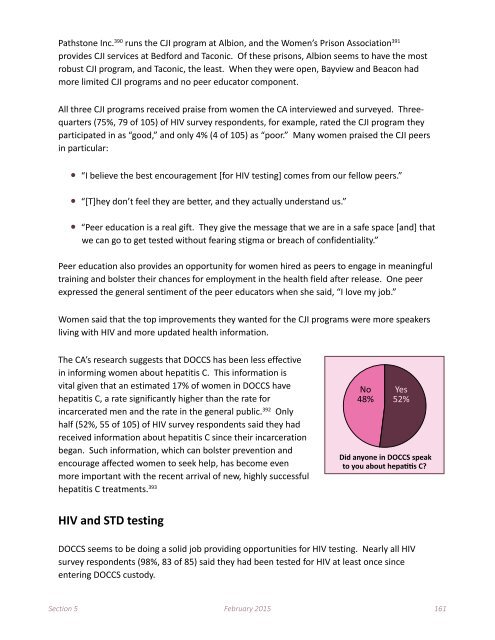Reproductive-Injustice-FULL-REPORT-FINAL-2-11-15
Reproductive-Injustice-FULL-REPORT-FINAL-2-11-15
Reproductive-Injustice-FULL-REPORT-FINAL-2-11-15
Create successful ePaper yourself
Turn your PDF publications into a flip-book with our unique Google optimized e-Paper software.
Pathstone Inc. 390 runs the CJI program at Albion, and the Women’s Prison Association 391<br />
provides CJI services at Bedford and Taconic. Of these prisons, Albion seems to have the most<br />
robust CJI program, and Taconic, the least. When they were open, Bayview and Beacon had<br />
more limited CJI programs and no peer educator component.<br />
All three CJI programs received praise from women the CA interviewed and surveyed. Threequarters<br />
(75%, 79 of 105) of HIV survey respondents, for example, rated the CJI program they<br />
participated in as “good,” and only 4% (4 of 105) as “poor.” Many women praised the CJI peers<br />
in particular:<br />
• “I believe the best encouragement [for HIV testing] comes from our fellow peers.”<br />
• “[T]hey don’t feel they are better, and they actually understand us.”<br />
• “Peer education is a real gift. They give the message that we are in a safe space [and] that<br />
we can go to get tested without fearing stigma or breach of confidentiality.”<br />
Peer education also provides an opportunity for women hired as peers to engage in meaningful<br />
training and bolster their chances for employment in the health field after release. One peer<br />
expressed the general sentiment of the peer educators when she said, “I love my job.”<br />
Women said that the top improvements they wanted for the CJI programs were more speakers<br />
living with HIV and more updated health information.<br />
The CA’s research suggests that DOCCS has been less effective<br />
in informing women about hepatitis C. This information is<br />
vital given that an estimated 17% of women in DOCCS have<br />
hepatitis C, a rate significantly higher than the rate for<br />
incarcerated men and the rate in the general public. 392 Only<br />
half (52%, 55 of 105) of HIV survey respondents said they had<br />
received information about hepatitis C since their incarceration<br />
began. Such information, which can bolster prevention and<br />
encourage affected women to seek help, has become even<br />
more important with the recent arrival of new, highly successful<br />
hepatitis C treatments. 393<br />
No<br />
48%<br />
Yes<br />
52%<br />
Did anyone in DOCCS speak<br />
to you about hepatitis C<br />
HIV and STD testing<br />
DOCCS seems to be doing a solid job providing opportunities for HIV testing. Nearly all HIV<br />
survey respondents (98%, 83 of 85) said they had been tested for HIV at least once since<br />
entering DOCCS custody.<br />
Section 5 February 20<strong>15</strong> 161


